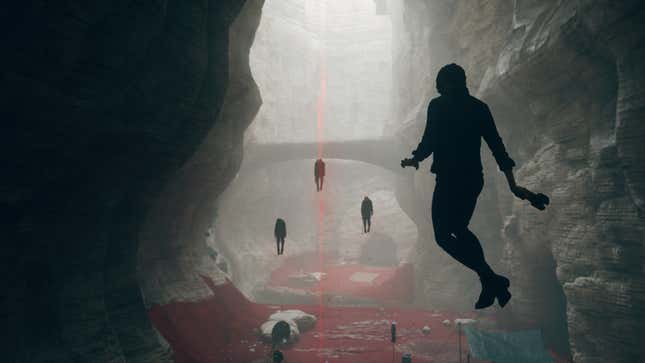
Control originally presented itself to me as a mystery. It was a new game from Remedy, the favorite development house for those of us unnaturally attached to Alan Wake and Max Payne, and it took place in some kind of shadowy government facility. I remained gracefully unspoiled and uninformed until I launched the game, and a year later, against all odds, the game isn’t any less mysterious. That’s what allows it to remain special.
In Mark Frost’s background book for the show Twin Peaks, appropriately named The Secret History of Twin Peaks, he distinguishes mysteries from secrets. A secret, one of his characters explains, is only a secret as long as you keep it. Once it is told, it’s just another piece of information. By contrast, a mystery cannot be fully solved—“it’s always out of reach, like a light around a corner.”
Most games have worlds built out of secrets. There are evil clowns with evil plots to destroy the world, or there are underground civilizations with plans to take the surface world once and for all. The experience of plot in these games is learning about these plans in order to live through them or foil them. In some of our most beloved games, complications arise because of secrets held by allies or enemies. There could be multiple enemy factions without clear goals, or our own human government could be running a shadow war against the galactic multicultural assembly. It is standard practice for the worlds of games to be mapped out to their edges, with motivations as clear as iron sights. Everything is built to be revealed, whether in a cutscene or an audio log or a text file or a tie-in novel constructed by a sci-fi great.
Part of Control’s brilliance is how it plays with the video game narrative form. We enter the Federal Bureau of Control as Jesse Faden, one in a long line of video game characters who exist so that exposition can be delivered to players. She’s a woman on the run, but also with a mission. Like us, she knows nothing about the agency. She’s led from goal to goal by an entity called Polaris, and we follow along. She slides into the paranormal world of the FBC via weird moments, and her role is solidified when entities from another dimension, the Astral Plane, select her to be the Director of the agency. She’s given a gun and pointed at the next goal without a lot of context, just like a thousand video game protagonists before her. For people who play games, this is very much charted territory.
Some general spoilers for Control follow.

The swerve that Control takes away from the path that other games often take is that it doesn’t let us understand everything. As Jesse Faden levels up and clears out more and more of the FBC’s base of operations, The Oldest House, she obtains a certain confidence that is mirrored in the player. She knows how the hallways come together, and she can defeat the invading and destructive Hiss with some regularity. She can provide backup for the other people who work in the agency, and she begins to piece together the relationships and connections between the former Director Trench, the researcher Dr. Darling, Head of Operations Marshall, and all of the others.
The broad plot, of course, is fully mappable. The slide projector that consumed Jesse’s hometown of Ordinary when her and her brother were children was taken by the FBC and experimented on. The researchers created portals to other worlds, and they brought the Hiss back with them. It went to work corrupting everything it could, including Director Trench and Dylan Faden, Jesse’s brother ,who was taken into the Bureau after the tragedy at Ordinary. All of those years, Jesse has been running around in the world and Dylan was trapped in the Oldest House, prepped to be the next Director. Instead, he became the key mouthpiece for the Hiss, and the work of Control is cleaning up the mess that’s already been made while preventing Dylan from infecting the power-granting Board that lives in the Astral Plane. And that’s the mission Jesse accomplishes by the end of the base game.
That’s the core concern, but Control stubbornly refuses to be simply about that core. Instead, when I think of Control, I think of the maelstrom of other questions and disparate ideas that swirl around it. What’s the status of the former Director who now serves as the power plant for the Oldest House? Where is the Black Rock Quarry in the universe, and how does its striated and anti-paranormal geology intersect with our history? What is the nature of The Oldest House? Are Objects of Power left over when something receded from our world, or are they something injected into it, like a poison? Maybe a cure? There are more questions I have, of course, but Control has as little interest in answering those as it does these others.

I was worried about the two expansions for Control before I played them. The first, The Foundation, told us that it was going to take us down into the history of The Oldest House both narratively and spatially. From a gameplay perspective, that meant the massive caves beneath the facility and their swiss cheese interactions with other worlds. We learn that the FBC predated The Oldest House, and that a former Director functionally made a deal with the devil that was the Board. We recognize that deal as a kind of negotiation for power, but to my delight the DLC didn’t actually explain anything. It told us more, and it gave us some origins, but the audio and text logs of the expansion made it very clear that we weren’t going to get definitive answers about how The Oldest House worked or why the Astral Plane stands outside of our world. Where most expansions and sequel content in games sews up the world with more connections and explanations, The Foundation simply proliferated mysteries.
The same can be said for the most recent AWE expansion. Previewed with an Alan Wake reference (AWE stands for Altered World Event in Control, yet many people joked that it meant Alan Wake Expansion here), I thought it was going to be a deep dive into the already-laid connective tissue between Control and 2010’s Alan Wake. Again, I was delighted to be wrong. The expansion obviously sets us up for a second Alan Wake game, and Wake is featured heavily, but it is so much more thematically focused on the FBC’s desire to capture the world. The expansion takes us through the defunct Bureau of Investigation, whose entire focus seemed to be recreating AWE sites and then capturing and interrogating survivors and victims. Rather than giving us a deep dive into how the agency operates in the world, AWE simply paints what we know already with a different brush, giving us a perspective on how the FBC warps the world in their image in order to exert force on everyone else.
For me, spending the past year with Control, playing the base game a few times and then going through the expansions, has really been a longform lesson in narrative and thematic design, with a bit of a magic trick thrown in. You think you’re getting answers, but actually you’re just proliferating mysteries. You get how people and locations and powers fit together, but you don’t know why they exist, or how they were created, nor how they can exert such force on the universe. It’s a mystery, and that brings me joy like no other video game has in a long time.




